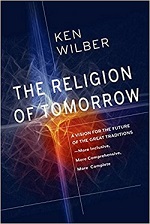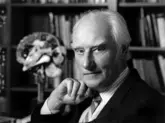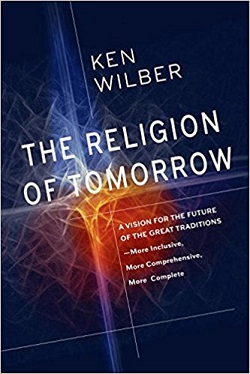|
TRANSLATE THIS ARTICLE
Integral World: Exploring Theories of Everything
An independent forum for a critical discussion of the integral philosophy of Ken Wilber
  Frank Visser, graduated as a psychologist of culture and religion, founded IntegralWorld in 1997. He worked as production manager for various publishing houses and as service manager for various internet companies and lives in Amsterdam. Books: Ken Wilber: Thought as Passion (SUNY, 2003), and The Corona Conspiracy: Combatting Disinformation about the Coronavirus (Kindle, 2020). Frank Visser, graduated as a psychologist of culture and religion, founded IntegralWorld in 1997. He worked as production manager for various publishing houses and as service manager for various internet companies and lives in Amsterdam. Books: Ken Wilber: Thought as Passion (SUNY, 2003), and The Corona Conspiracy: Combatting Disinformation about the Coronavirus (Kindle, 2020).  Frank Visser, CLIMBING THE STAIRWAY TO HEAVEN
Frank Visser, CLIMBING THE STAIRWAY TO HEAVENA 7-Part Review of Ken Wilber's The Religion of Tomorrow (2017) Part I: The Involution/Evolution Cosmology Part II: From Atom to Atman Part III: A More Adequate Spectrum of Colors? Part IV: What Is It Like to Be a Super-Nova? Part V: Rational Reasons to Believe in Spirit? Part VI: Is Darwin Really 'On Our Side'? Part VII: Climbing the Stairway to Heaven THE WHOLE SERIES: FREE DOWNLOAD AS PDF Review of "The Religion of Tomorrow", Part V
Rational Reasons to
|
|||||||||
| THREE VIEWS OF NATURAL HISTORY | ||
|---|---|---|
|
MYTHIC: CREATIONISM |
RATIONAL: DARWINISM |
MYSTICAL: INTEGRALISM |
| Species have been created by God | All species have a common ancestor | Evolution is driven by Spirit/Love/Eros |
In his latest work, Wilber gives a nice expression to the general religious orientations humanity has had and will have in past, present and future. In the past, God was literally everywhere, both in nature and in human culture. But in modern times, God seems to have retreated or disappeared completely from the scene. So we have gone from a GOD IS EVERYWHERE to a cultural phase in which there is NO GOD ANYWHERE. However, we're in some kind of intermediate period between dusk and dawn, for in the future, Wilber optimistically and prophetically relates:
It is important to realize, what type of religion will have to be left behind, if this scenario is to be realized on any global scale. No more divine interventions in nature or culture. No more chosen people, of any kind. No special favors for anyone pleading for mercy. No special position for our Earth, or any of its inhabitants. But on the positive side, human nature provides means to contact the divine Spirit directly, through meditative practices that do not require any belief systems or dogma's to be effective. A step-wise path of super-integral stages and states of consciousness awaits us on our way to Supermind. A pervasive, cosmic, impersonal universal force will bring us back home. That is, in this Gospel according to Ken. As said, it will be a very different God from the one we were used to and this requires a whole new "God-talk", as he discusses in his last chapter.
However, the reasons given for both the old and the new ways of speaking about God might be very similar in that they both argue against a materialist-reductionistic view of the universe. It is only natural that Wilber has seen some creationist authors as natural allies in this respect. However, his view of spirituality is far removed from the creationism behind both fundamentalism and Intelligent Design, so choosing these authors as allies can easily backfire. What if science refutes creationism on scientific grounds, will integralism suffer the same fate? What is more, compared to Intelligent Design, Wilber's dealings with biology seem often less sophisticated then one might expect from a supposedly more advanced point of view—in A Brief History of Everything, for example, Wilber pointed to long-discredited examples of the evolution of eyes and wings as proofs for a creative force in evolution. Most creationists have stopped using these examples by now.
Let's explore how Christian fundamentalists argue for the "rationality" of their beliefs. An online search for this brings up hundreds of examples. As only one prominent one, the conservative-Christian website PJMedia gives the following reasons "Rational Thinkers Choose to Believe in God"[4]:
- Belief in God Is Logical. God's Fingerprints Cover the Universe. It Is Irrational to Believe That the Universe Was Created Out of Nothingness.
- If God Does Not Exist Then There Is No Objective Definition of Good and Evil. Everyone's Subjective Feelings Of Good and Evil All Have the Same Level of Authority.
- If God Does Not Exist Then Man Is Just A Part of Nature, Of Equal Value to Anything Else. If God Does Not Exist Then Human Life Is Not Sacred.
- There Is Nothing That God Could Do to Prove His Existence Conclusively. It Is Simply a Matter of Weighing the Evidence For or Against and then Making a Leap of Faith. Rational People Make the Choice Which Is More Likely To Lead to a Happier, More Productive, More Meaningful Existence. Do you Worship an Infinite, Transcendent God or Do You Worship Nothingness? What Do You Worship?
- If God Does Not Exist Then Life Is Meaningless. What Difference Does It Make If You Live Like a Saint or a Criminal if In the End Your Consciousness Disappears Permanently And Eventually Everything You Ever Did Is Forgotten?
- If God Does Not Exist Then Freedom Is An Illusion. We're Just the Pawns of Mother Nature, Programmed Like Robots. It is More Rational To Choose To Believe That God Has Created Man To Live Free Than Mother Nature Gave Birth To Us So We Could Live As Her Slaves.
The first argument echoes the verse from Psalm 19:1: "The heavens are telling the glory of God, and the firmament proclaims his handiwork." In modern language we would say that the cosmos seems mysteriously to be fine-tuned for life, or even for our human existence. But basically these "arguments" amount to saying: without God life would be meaningless, immoral, profane, without the possibility of freedom and hope of the after-life. With God, all of the opposites are true: life has meaning, has a basis for morality, is sacred, with freedom and hope for an after-life. That, however, doesn't address the truth-question at all. To quote Richard Dawkins[10]:
"But to say that something is comforting is not to say that it's true."
According to Wilber, "there is abundant support to believe in a universal spiritual dimension to the Kosmos". That is, of course, quite a claim, and we will be interested in seeing the reasons he gives for this belief. According to his developmental model, human beings go through many stages, and each stage sees, so to speak, a different world. Discussing the transition from a mythic-religious to a rational-scientific worldview, Wilber writes:
The astronomer Hugh Ross calculated that "less than 1 chance in 10144 (trillion trillion trillion trillion trillion trillion trillion trillion trillion trillion trillion trillion) exists that even one such planet [a planet that supports life] would occur anywhere in the universe."[5] Einstein himself said that the universe evidences "an intelligence of such superiority that, compared with it, all the systematic thinking and acting of human beings is an utterly insignificant reflection."[6] Looking at all the evidence, Francis Crick, Nobel Prize-winning codiscoverer of the structure of DNA, concluded that "An honest man, armed with all the knowledge available to us now, could only state that in some sense, the origin of life appears at the moment to be almost a miracle, so many are the conditions which would have had to have been satisfied to get it going."[7] Miracle indeed. (497-8)
So Wilber points to mystical experience as "proof" for Spirit, but one wonders how extraordinary human experiences can provide evidence for something like the driving force behind evolution, or even the creation of the whole cosmos. At most we could say that these experiences provide proof for the existence of some spiritual element in human nature, but that's a far cry from these cosmological or biological extrapolations.
Wilber, however, doesn't see this as a problem, since evolutionary science (supposedly offering "a mere 'chance and natural selection' explanation") is incapable of offering a rational explanation for nature's wonderful complexities. As David Lane has mentioned in his review of The Religion of Tomorrow, "Ken Wilber and 'Moronic Evolution'", quoting Hugo Ross without mentioning that he is a Bible thumping creationist, is misleading to say the least. Apparently, it serves Wilber's agenda of downplaying the accomplishments of cosmological and biological science so much, that he doesn't seem to be hindered by these details. Quoting three famous people—a creationist, poor Einstein and a famous ("Nobel Prize-winning", no less) scientist—completes the "argument" that the notion of a spiritual dimension in the cosmos is secured by "abundant support".
But what did Francis Crick actually say? Did he argue for a spiritual origin of life and the universe? That is hardly likely, knowing the man and his work. Looking up the source of Wilber's quote I found the following on Rationalwiki.org:

Francis Crick: “The origin
of life appears at the moment
to be almost a miracle…”
Being a well-famous biologist and one of the best-known proponents of panspermia, Crick is frequently quote-mined by creationists. In Life Itself, Its Origin and Nature, he stated:
"An honest man, armed with all the knowledge available to us now, could only state that, in some sense, the origin of life appears at the moment to be almost a miracle..."
However, the ellipsis there marks the start of a less frequently quoted section (and often creationists citing this comment will leave out the ellipsis to try and punctuate it at "miracle"). Crick continues, lest he be accused of being a total idiot rather than a fairly competent scientist:
"...so many are the conditions which would have had to have been satisfied to get it going. But this should not be taken to imply that there are good reasons to believe that it could not have started on the earth by a perfectly reasonable sequence of fairly ordinary chemical reactions. The plain fact is that the time available was too long, the many microenvironments on the earth's surface too diverse, the various chemical possibilities too numerous and our own knowledge and imagination too feeble to allow us to be able to unravel exactly how it might or might not have happened such a long time ago, especially as we have no experimental evidence from that era to check our ideas against."
In short, Crick acknowledges the difficulties in really figuring out the origin of life but doesn't suggest a literal miracle. (emphasis added, FV)
Telling, indeed, that Wilber's paragraph ends with this word: "miracle"—with special emphasis. If creationists like to "quote-mine" Crick and other famous scientists for spiritually sounding statements, Wilber is no different here. This is simply painful.
WILBER'S Four Rational reasons to believe in Spirit
But then, in the next paragraph, Wilber gives a more detailed and systematic justification for presenting his speculations that even a rationalistic-secular person could be persuaded to accept the notion of a spiritual universe (we have broken them down in separate bullets visually for clarity):
(a) the "creative advance into novelty" that is demonstrated by evolution itself and is inexplicable by mere "chance mutation" (the evolution from strings to quarks to subatomic particles to atoms to small molecules to massively interconnected molecules to asexual cells and early organisms—just for starters—is an awful lot of evolution in a universe that is supposed to be "running down" but can easily be seen as yet more evidence of creative Eros or Spirit-in-action, "a self-organizing self-transcendent drive," as Erich Jantsch put it);
(b) the evidence from numerous sciences on the interwoven, entangled, enacted, interconnected nature of all seemingly separate things and events (these are still 3rd-person deductions and should not replace 1st-person direct meditative evidence, but are further evidence of a self-organizing drive);
(c) the presence of consciousness as an undeniable reality throughout the universe (the denial of which is a performative contradiction); and most significantly,
(d) the experimental and injunctive proof of Spirit's existence by following paradigms, practices, and exemplars, from contemplation to highest yoga —this is not God taken on faith but based on direct personal experience, a "science of the interior," which, in every major culture the world over, has a practice leading to a "satori" or "Self-realization" that discloses a direct experience of Spirit itself, by whatever name. (p. 498)
Argument (a) has been discussed in several essays by me on Integral World[8]. The phrase "creative advance into novelty" is from process philosopher Whitehead, and is often used by Wilber to refer to this mysterious question of how on earth anything new could possible have arisen. However, postulating "novelty" as a cosmic principle that cannot be explained any further hardly does anything more than begging the questions we have about nature. Science, in contrast, tries to unravel the mechanism behind seemingly mysterious natural phenomena, and books progress every day. It is an anti-science and anti-discovery stance to postulate a cosmic driving force such as Wilber's Eros, to throw light on these phenomena. It is not just that Wilber has meditated a lot and prefers to speak about these extraordinary experiences using some mystical poetry. No, he often uses these notions deliberately and specifically to "explain" natural phenomena—without ever specifying the details, of course.

Hardcover, Shambhala, 2017, 806 pages.
To continue, using the phrase "chance mutation" as catch-all for all the various mechanisms science has suggested to explain the diversity of nature—ranging from natural selection to epigenesis, to genetic drift to catastrophes...—betrays a deeply inadequate understanding of science. And again, using "running down" as a put-down for those well established scientific theories that respect the Second Law of Thermodynamics in that, in the end, our universe is unavoidably cooling down, betrays, again, a deeply inadequate understanding of basic laws of science. Not to mention the fact that some theorists argue that life and its complexity are not going against these cosmic trends but are only possible because of them (the field of Big History, about which I have written three long essays for Integral World, offers a much more reliable source of information on science here[9]). And finally, the phrase "self-organizing drive" for some force supposedly present in the universe at large betrays a misunderstanding by Wilber of the sciences of complexity, which to the best of my understanding do away with these cosmic "drives'' (otherwise self-organization would not be self-organization, which happens decisively only under certain special conditions anyways).
Regarding argument (b), I have no idea what to make of "evidence from numerous sciences on the interwoven, entangled, enacted, interconnected nature of all seemingly separate things and events", nor how this could possibly provide "further evidence of a self-organizing drive". To argue, under argument (c) for "the presence of consciousness as an undeniable reality throughout the universe" is to overlook a vast literature on consciousness and its possible origin, ranging from materialism to panpsychism to idealism. It is not at all obvious how denying the cosmic prevalence of consciousness would deny it in the case of human beings, or evolved organisms as such. And finally, argument (d) consists of one of Wilber's favorite topics: to see meditation as a form of "deep science" in its own right, and to claim that using these contemplative methods "Spirit" can directly be experienced.
It is, however, one thing to respect the fact that throughout history human beings have reported extraordinary spiritual experiences, it is wholly something else to claim, as Wilber typically does, that these insights throw any meaningful light on the workings of the cosmos or of evolution at large. It is clear from The Religion of Tomorrow that Wilber claims to know the highest mystical experiences from personal experience (given the authoritative tone of his explanations). But is Wilber's notion of an "Eros in the Kosmos", a driving force behind evolution in nature and culture, even in the recent US elections, really a universal mystical conclusion, or only his idiosyncratic conviction? Does he claim to know Supermind, the "Mind of God" so speak, so he can claim deeper knowledge of what really makes the universe tick?
ON MOVING TOO FAST
This leaves the whole argument for a spiritual dimension to the cosmos in dire straights, and the fate of Wilber's futuristic speculations hangs on this. In the end, integralists are no better off than fundamentalists when they have to make a "leap of faith" after having weighed all the evidence. Believing in a mystical future with extraordinary stages and states of consciousness on the horizon (and Wilber's The Religion of Tomorrow provides an exceptionally detailed catalogue of this field), is without any doubt uplifting and inspiring for many modern-day people who have left traditional notions of religiosity behind and who find the current scientific outlook on reality depressing and devoid of meaning.
That, however, could be a very personal judgment. Most scientists experience their life of wonder and investigation as extremely meaningful. Even if the total universe is devoid of meaning, at least as this concept is understood by us humans, our personal lives can very well be meaningful when we have found relationships or activities that are close to our hearts. It is doubtful if a religion of the future, if ever there is one, should base itself on half-baked scientific theories or questionable speculations of one big, unspecified, force behind all of nature's and culture's complexities.
Wilber is moving too fast through the intermediate phase of rationality and science, in my opinion, enamored as he is by the splendid mystical future that awaits us. But in his own terminology, this can be seen as a developmentally dysfunctional situation, in which the current cultural phase of modernity is not "transcended and included" but "transcended and rejected". It is fueled by, what he calls Phobos, a fear of nothingness and meaninglessness perhaps, of a world that doesn't show a Grand Design. It is a questionable assumption of both fundamentalism and integralism that, without some God or Spirit, life couldn't have started in the first place. Or that our own lives are somehow incomplete without such a spiritual dimension. But listen to "arch-reductionist" and "ultra-darwinist" Richard Dawkins (whom Wilber thinks, like all of the New Atheists, suffers from a case of repressed spirituality — p. 319). Does this sound depressed, hopeless, meaningless?
The world and the universe is an extremely beautiful place, and the more we understand about it the more beautiful does it appear. It is an immensely exciting experience to be born in the world, born in the universe, and look around you and realize that before you die you have the opportunity of understanding an immense amount about that world and about that universe and about life and about why we're here. We have the opportunity of understanding far, far more than any of our predecessors ever. That is such an exciting possibility, it would be such a shame to blow it and end your life not having understood what there is to understand. (Richard Dawkins) [10]

NOTES
[1] Ken Wilber, The Religion of Tomorrow: A Vision for the Future of the Great Traditions — More Inclusive, More Comprehensive, More Complete, Boulder, Shambhala, 2017, viii + 806 pages.
[2] Since the book The Religion of Tomorrow is very big a conventional review seems not appropriate—it is simply "too big to review"—that's why we have chosen to reflect on its content in several topical essays.
[3] Frank Visser, "Demystifying evolution: How do Creationism, Darwinism and Integralism Compare?", www.integralworld.net
[4] David Swindle, "6 Reasons Why Rational Thinkers Choose to Believe in God", April 22, 2013, www.pjmedia.com
[5] Hugh Ross, The Creator and the Cosmos: How the Greatest Scientific Discoveries of the Century Reveal God (Colorado Springs, CO: NavPress, 2001), 198. (Quoted in Wilber, 2017)
[6] Albert Einstein, Ideas and Opinons, ed. Carl Seelig (New York: Three Rivers press, 1995), 40 (Quoted in Wilber, 2017)
[7] Francis Crick, Life Itself: Its Origin and Nature (New York: Simon and Schuster, 1981), 88. (Quoted in Wilber, 2017)
[8] Here's an incomplete list of essays dealing with Wilber's (mis)understanding of basic science:
- Frank Visser, The 'Spirit of Evolution' Reconsidered: Relating Ken Wilber's View of Spiritual Evolution to the Current Evolution Debates, August 2010, www.integralworld.net
- Frank Visser, Entropy and Evolution, Ken Wilber's arguments for "an infinitely powerful force" behind evolution debunked, July 2014, www.integralworld.net
- Frank Visser, "Is the Universe Really Winding Up?", August 2014, www.integralworld.net
- Frank Visser, "'Equilibrium is Death', Energy, Entropy, Evolution and the Paradox of Life's Complexity", February 2016, www.integralworld.net
- Frank Visser, "Science Has No Answer, Ken Wilber's Mistaken Strategy of Belittling Science", April 2016, www.integralworld.net
[9] The interface between Integral Theory and Big History is discussed in three of my essays on Integral World:
- Frank Visser, "Integral Theory and the Big History Approach: A Comparative Introduction", May 2013, www.integralworld.net
- Frank Visser, "Integral Theory and Cosmic Evolution: A Naturalistic Approach", December 2014, www.integralworld.net
- Frank Visser, "Big History and Integral Theory: Bill Bryson Meets Ken Wilber", July 2016, www.integralworld.net